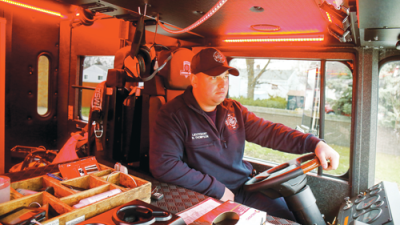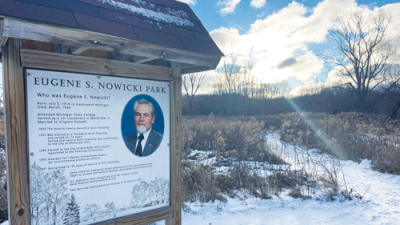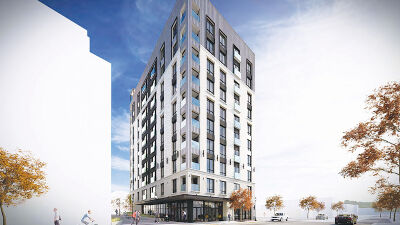MADISON HEIGHTS — The new fiscal year began July 1 in Madison Heights, backed by a budget featuring a slightly reduced millage rate from the fiscal year that just ended.
The overall budget weighs in at $70.7 million, with $42.6 million allocated for the general fund. The new millage rate is 26.0771 — a slight reduction from the 26.2646 mills for the amended budget in fiscal year 2021-22. The city collects $1 for every $1,000 of taxable value, times the millage rate.
The total millage rate covers the general fund that supports police, fire and medical services, the court, general administration, parks, library, recreation, the city clerk and elections. It also includes special millages to fund neighborhood road improvements, solid waste disposal, senior citizens services, police and fire retiree benefits, the fire station bond and the drain debt.
In the fiscal year that just ended, there had been a 4% increase in water and sewer rates after what had been three years of no rate increases, and 1.44% more for stormwater rates, with those being direct pass-through charges from Oakland County. For the new fiscal year, the city is currently in the middle of a utility study that could recalculate stormwater rates from the county. The budget, as it stands, features no change in rates, but a recommendation is expected later this year.
The new budget uses about $5.1 million from the fund balance. The unreserved budget balance currently projected for FY 2022-23 is roughly $8 million.
The city is planning $21 million toward capital improvements across all funds in FY 2022-23. Highlights include four new police vehicles, heating and air conditioning systems at the Police Department, new breathing equipment for the Fire Department, a new street sweeper, parking lot improvements at Rosie’s Park, the new pavilion at Rosie’s Park, a new playscape at Civic Center Park, library renovations, a new Active Adult Center, renovations at City Hall, a new van for senior services, $2.3 million in road work, $700,000 in water main replacements and $150,000 in sewer rehabilitation.
The city is adding two new police patrol officers to serve as school liaison personnel. These are funded 60% by each district, and 40% by the city. Staffing levels will otherwise remain status quo, focusing on infrastructure and maintaining assets across city buildings, parks and facilities.
The new fiscal year is projected to bring revenue growth across all funds, thanks in part to a State Tax Commission inflation rate multiplier of 3.3%, and an increase in state revenue sharing.
But according to Melissa Marsh, the city manager, the city’s taxable value for FY 2022-23 is only 78.8% of what it was in FY 2007-08.
“Unfortunately, we are also experiencing expenditure pressure from inflationary increases,” Marsh said in an email. “Due to the upward pressure on expenditures, and our continued need to address deferred maintenance from the recessionary period from 2009 to 2015, we remain very cautious about adding new programs or restoring portions, creating recurring expense.
“The overall budget focuses on following the strategic plan for moving the city forward by implementing projects that address these long-term maintenance issues, and are in line with the long-term vision of the City Council,” she continued. “The budget continues to accomplish the goals established in our strategic plan.”
During the new fiscal year, staff will work on creating focused “neighborhood improvement” areas that will help maximize programming opportunities for home repairs, code enforcement education and public amenities. The programs will be funded through various means, including an allocation of $3,000 from the general fund, $26,000 through a Community Development Block Grant, $25,000 through a Michigan State Housing Development Authority grant, and private contributions totaling $27,000.
The ongoing renovations at City Hall, the library and Fire Station No. 2, along with plans to create a new Active Adult Center between City Hall and the library, came about because the city had deferred many maintenance costs during the recession unless they reached emergency levels, which led to $15.5 million in needed repairs. It was decided it would be more cost-effective to renovate rather than continually repair. The overall project is the largest capital improvement undertaking in the city’s history, with $10.7 million budgeted for the buildings at Civic Center Plaza, and $2 million for Fire Station No. 2.
The new budget continues to develop the parks. The city finalized its master plan for parks and recreation in March 2021, and in the past fiscal year, the general fund allocated more than $600,000 for improvements in the parks, which was extended with grants. This resulted in more than $890,000 in parks improvements. For the new fiscal year, this work will be bolstered with an additional $645,000, including $50,000 for a special project allocation, which can be carried forward into future budget years, saved for a major park enhancement, or used for match grant opportunities.
In FY 2020-21, the city’s Community and Economic Development Department started working with the Michigan Economic Development Corporation to gain recognition as a Redevelopment Ready Community. The program provides funding to implement best practices for economic development across the state.
The city is budgeting to address three areas as part of this program, including an update to its zoning ordinance that will make it more user-friendly with new and improved standards; training for the Zoning Board of Appeals and Planning Commission so they can better fulfill their roles; and the creation of a formal plan for economic development and marketing the city. The work will be mostly handled in-house at the city, at no additional cost, except for the zoning ordinance update, which will cost $55,000, offset by a $30,000 MEDC grant.
Marsh said that the legacy cost of pensions and retiree health care has been a major financial challenge for the city each budget cycle since 2007. During the 2021 calendar year, the city’s administrative team made significant changes to retiree health care, bringing it in line with the options offered to active employees. This change reduced the city’s liability from over $101 million to just under $45 million, saving roughly $57 million. The new budget reflects this change by moving the funding for retiree health care premiums to the retiree health care trust, instead of being paid from current general fund resources.
The new budget also provides $47,000 for a sustainability project that will continue repopulating the city’s tree canopy. Another sustainability project sees the city working with its electricity provider, DTE, on an electrical vehicle assessment. However, the new budget does not currently include funding for any electrical vehicle projects. Officials say they will study the issue and likely budget for programs such as charging stations and fleet conversions starting in FY 2023-24.
Sean Ballantine, the public works supervisor for Madison Heights, said that the new budget has given his department what it needs for the year ahead.
“The Department of Public Services is involved in every city operation in some form. This approved budget provides the necessary support to our department in several ways,” Ballantine said in an email. “Infrastructure improvements in our facilities, investment in parks and recreation, replacement of vehicles — the list goes on and on. It represents the unfailing support of the council and city manager for the work that we do, and provides us the tools necessary to give our residents the highest standard of excellence in service and city amenities.”
 Publication select ▼
Publication select ▼















